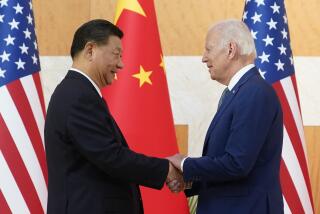Bush, on China Trip, to See Key Dissident, Sources Say
- Share via
WASHINGTON — President Bush is making plans to meet Fang Lizhi, China’s most prominent human rights activist and an outspoken critic of the Chinese Communist Party, during his visit to Beijing this weekend, according to sources familiar with the White House planning.
The meeting would mark the first time on any White House trip to Beijing that a President has met with a Chinese dissident.
Fang, 52, an internationally recognized astrophysicist, has often been compared to longtime Soviet dissident Andrei D. Sakharov. Fang was expelled from the Chinese Communist Party and fired from his job as a university vice president two years ago for his role in encouraging Chinese students to carry out a series of demonstrations for democracy.
In a series of scathing interviews since that time, Fang has asserted that Marxism “is no longer of much use” in China and that the Communist Party “cannot boast a single success” since taking over the country in 1949. The Chinese regime has allowed Fang to remain at liberty in Beijing, although it has curbed some of his plans to travel overseas.
Asked what his government’s reaction would be to a Bush meeting with Fang, Wu Zurong, a spokesman for the Chinese Embassy in Washington, replied late Monday: “We are not aware of this suggestion.” He had no further comment.
According to the sources, Fang has been invited to a reception that Bush will attend Sunday at the American Embassy in Beijing. It was not clear how much time the two will spend together.
The President is scheduled to meet with China’s senior leaders--including Deng Xiaoping, Premier Li Peng, President Yang Shangkun and probably Communist Party Secretary Zhao Ziyang--during his brief visit to China. Bush will be in Beijing on Saturday and Sunday after traveling to Japan to attend the funeral of Emperor Hirohito.
The planned session with Fang would be similar in some respects to one that then-President Ronald Reagan held with Soviet dissidents in Moscow last year. Reagan took time out from his meetings with Soviet President Mikhail S. Gorbachev to meet with Soviet human rights advocates at Spaso House, the American ambassador’s official residence.
Bush, Secretary of State James A. Baker III and National Security Adviser Brent Scowcroft gathered Monday at Camp David, the presidential retreat in Maryland’s Catoctin Mountains, to prepare for the Asia trip.
Leading Asia Scholars
The President and his aides also called in a group of America’s leading Asia scholars to hear their advice about the trip. The experts included Harry Harding of the Brookings Institution, Michel Oksenberg of the University of Michigan, Lawrence Krause of UC San Diego and Richard Baum of UCLA.
According to one participant in the meeting, who asked not to be identified, the scholars told Bush that he should keep U.S. policy toward China on a steady course. They said that there is no need for the United States to alter its policies simply because of Gorbachev’s forthcoming summit in Beijing.
The Soviet leader is scheduled to visit China and meet with Deng in mid-May. It will be the first meeting between the top leaders of the world’s two largest Communist nations since Nikita S. Khrushchev saw Mao Tse-tung in Beijing in 1959.
“The message was, ‘If the relationship (between the United States and China) ain’t broke, don’t fix it,’ ” said one of those who took part at the Camp David meeting Monday.
The Asian experts were also said to have told Bush that the United States should avoid being placed in the role of intermediary between China and Taiwan. For several years, the Communist regime in Beijing has been urging the United States to play a more active role in encouraging Taiwan to reunify with the mainland.
Irritation at Aquino
According to one participant, during the overall review of U.S. policy toward Asia at Camp David, Bush personally expressed irritation at President Corazon Aquino of the Philippines for failing to give stronger support for the U.S. military bases in that country.
The lease under which U.S. forces operate Clark Air Base and the Subic Bay Naval Base in the Philippines expires in 1992. Many Philippine legislators have called upon the government to terminate the leases.
During the Camp David session, meanwhile, Baker was said to have taken a particularly strong interest in the question of how to persuade South Korea and Taiwan to let their currencies appreciate against the dollar. Such an action would make exports from those areas to the United States more expensive.
Bush and Baker are planning to stop for several hours in South Korea after their trip to China. They will not stop in Taiwan, with which the United States has no formal diplomatic relations.
More to Read
Sign up for Essential California
The most important California stories and recommendations in your inbox every morning.
You may occasionally receive promotional content from the Los Angeles Times.










